Austin Works to End Youth Homelessness By 2020
By Michael Minasi
Reporting Texas
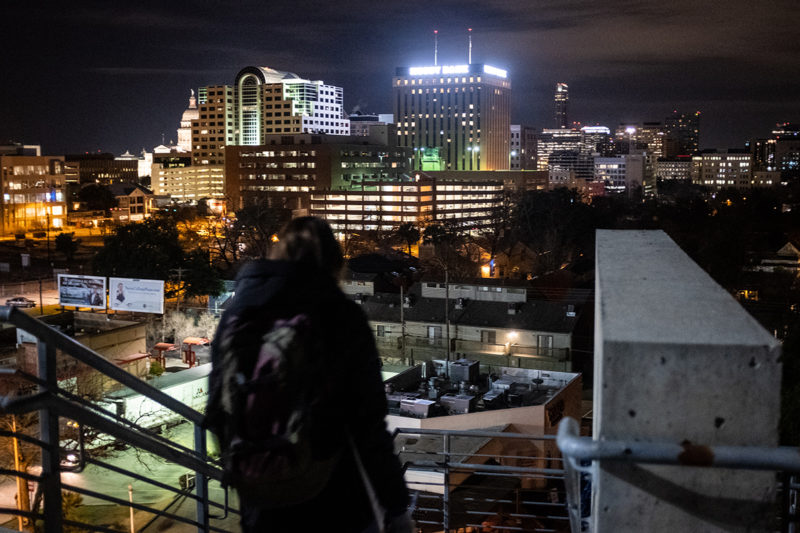
LifeWorks employees participate in the annual point-in-time count on Jan. 26 in downtown Austin. The point-in-time count revealed 2,255 people experiencing homelessness, an increase of 5 percent over 2018. Michael Minasi/Reporting Texas
After aging out of the foster care system in 2017, Austin resident Jesse Lowrey landed on the streets, where he battled substance abuse and became vulnerable to sex trafficking. The 19-year-old experienced homelessness for almost two years until he moved into transitional housing run by the nonprofit organization LifeWorks in late January 2019.
One month later, an energetic Lowrey was greeting more than a dozen people as they filed into the nonprofit’s board room in a two-story office building in South Austin. They were there to participate in a fundraising event for LifeWorks called A Night Out, in which participants raise money for the organization and then spend one evening learning what it is like to live on the street.
The experience was a small part of an ambitious plan put together in 2017 by dozens of organizations — including LifeWorks, Caritas of Austin, the SAFE Alliance and the Ending Community Homelessness Coalition — to end youth homelessness in Austin by 2020. It’s a plan that is funded in large part by the U.S. Department of Housing and Urban Development, and a plan that advocates say is starting to have an effect.
During the past decade, there has been a burgeoning nationwide push to understand and address youth homelessness. In 2017, Austin received a $5.2 million grant to that end from HUD. Ten other communities around the nation, including Seattle, San Francisco and Nashville, were also awarded funding — totaling $33 million — in 2017.
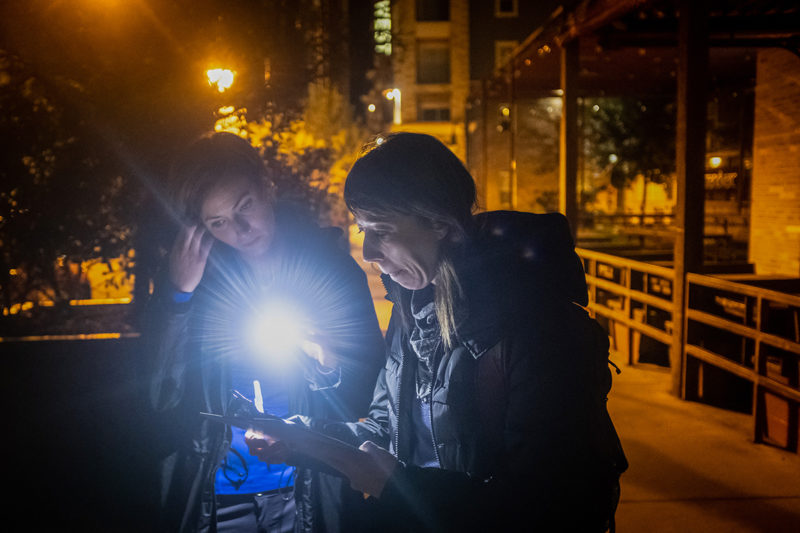
LifeWorks employees Lauren Katz, right, and Laura Poskochil, left, record homeless survey data during the annual point-in-time count on Jan. 26 in downtown Austin. Michael Minasi/Reporting Texas
The 2019 point-in-time count of people experiencing homelessness, organized by the Ending Community Homelessness Coalition, showed that while overall homelessness was up by 5 percent in Austin from 2018, youth homelessness dropped by 25 percent — from 142 youth experiencing homelessness to 107. Susan McDowell, executive director of LifeWorks, attributes the improvement to the community plan to end youth homelessness by 2020.
“We have a lot of challenges in front of us, a lot of work, and a lot of scaling to do. But, this is telling us that … we can be successful,” McDowell said.
Samantha Batko, a researcher at the Urban Institute, a think tank that focuses on economic and social policy, says that while it is difficult to compare the effectiveness of different communities’ efforts to combat youth homelessness, Austin is a leader in addressing the issue.
“I do think that Austin is unique in that they have been one of these jurisdictions that have been repeatedly working on the issue and attempting to experiment with, test and innovate around” youth homelessness, Batko said.
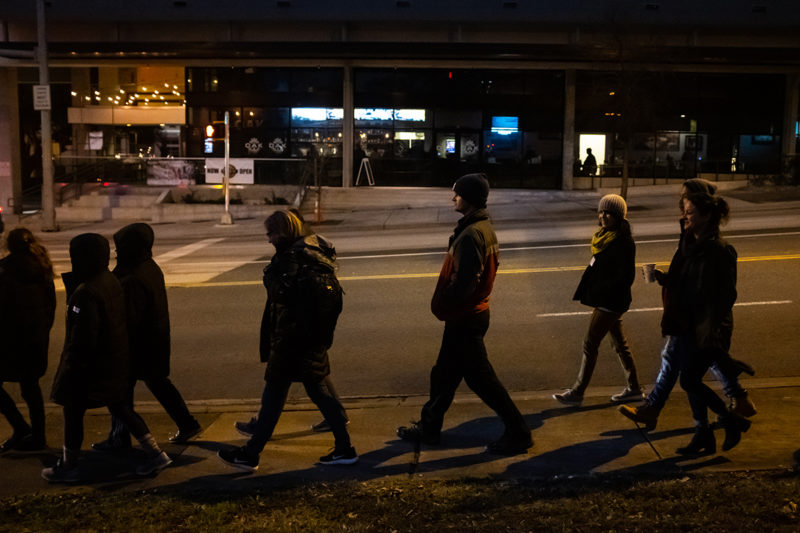
Attendees of A Night Out, a fundraising event for LifeWorks, embark on a 30-minute walk to H-E-B grocery story on Feb. 28 in Austin. Michael Minasi/Reporting Texas
LifeWorks is working with its partners to develop a support system that is so efficient and effective that youth homelessness is rare, brief and nonrecurring, McDowell says. McDowell pointed to the city’s successful effort to end homelessness among U.S. military veterans as an example of what can be accomplished with enough resources. In 2016, the U.S. Department of Housing and Urban Development certified that Austin had effectively ended veteran homelessness.
In October, LifeWorks launched three new projects linked to the community’s 2020 goal to end youth homelessness. The first was a diversion program that coordinates with entities such as Child Protective Services, the Texas Juvenile Justice Department and the Austin Independent School District to identify young people experiencing a housing crisis and connect them with supportive services and financial assistance.
Foster children are particularly vulnerable to homelessness when they transition out of the foster care system, according to the National Conference of State Legislatures. In Travis County, 76 percent of youth living on the street have experienced Child Protective Services, the Texas Juvenile Justice Department or both, according to a study from the Voices of Youth Count initiative at the University of Chicago. “This tells us youth homelessness is largely a problem of emancipation from these systems, McDowell said. “So we’re working at the systems level to divert homelessness and make it rare.”
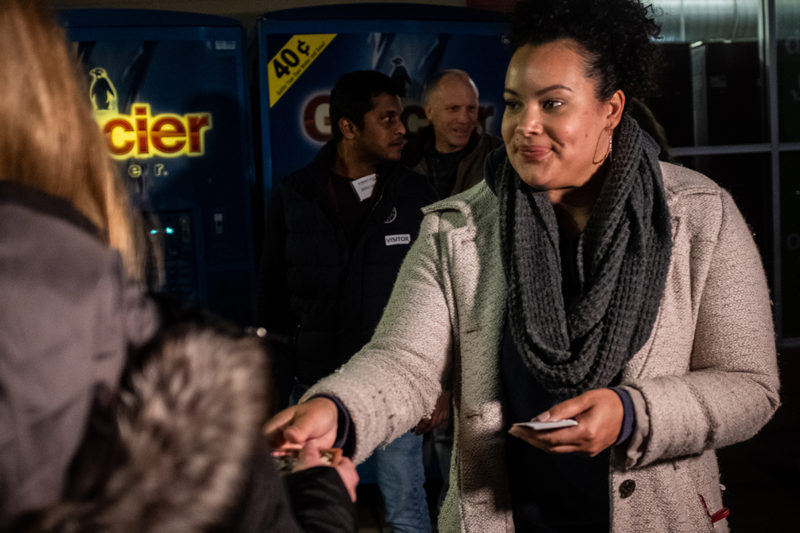
Julianne Hanckel, communications for LifeWorks, hands out $5 H-E-B gift cards to participants during A Night Out on Feb. 28 in Austin. Participants had to buy the provisions they would need for the night with a single $5 gift card. Michael Minasi/Reporting Texas
Also in October 2018, LifeWorks opened the Permanency Through Outreach and Rapid Transitions, or PORT, transitionary housing for young adults ages 18-24. In accordance with LifeWorks’ housing-first policy, the PORT does not discriminate against clients with substance abuse problems.
The third LifeWorks initiative involved a significant scaling of its Rapid Rehousing program. Rapid Rehousing includes apartment location services, financial assistance and wrap-around support services that help clients get on their feet. The program can serve people with varying degrees of assistance for up to three years.
“In the last four months we have housed almost 60 youth through Rapid Rehousing, which is huge. If you took that section from the year before, the number was more like seven,” McDowell said in February.
On Feb. 28, LifeWorks for the first time organized A Night Out in conjunction with Amplify Austin, the city’s annual day of giving for nonprofits, McDowell said. Each attendee had to raise a minimum of $500 to participate, and collectively they raised $8,418. Ultimately, the nonprofit raised more than $80,000 from 169 donors in the 24-hour period, according to the Amplify Austin website.
Soon after introductions during the event, participants walked for 30 minutes to an H-E-B supermarket. LifeWorks employees gave each person a $5 gift card to acquire their provisions for dinner, which everyone ate together at a local city park. During the dinner, Taylor Hamilton-Clark, a 24-year-old who said she had been homeless for six years before she found housing through LifeWorks, shared her experiences and her goals for the future.
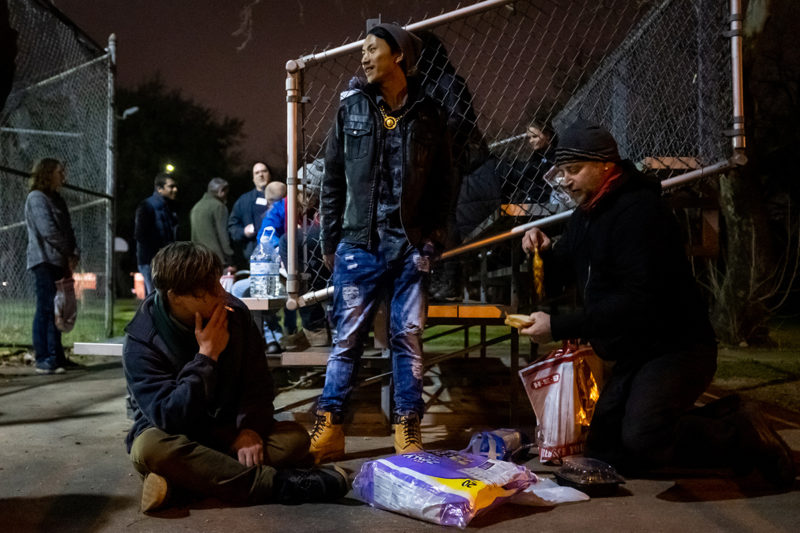
From the left, Jesse, 19, and Jimmy, 21,and Stephen Zabel, a software developer from Q2, eat a meal cobbled together from $5 gift cards at H-E-B during A Night Out on Feb. 28, 2019 at Gillis Neighborhood Park in Austin. Jesse and Jimmy, who have experienced homelessness, told Zabel about living on the street. Michael Minasi/Reporting Texas
“I want a house. I want to go to college to be a sign language interpreter. I want my life to be set. I want to prove everyone who said I couldn’t wrong,” Hamilton-Clark said.
After dinner, participants zipped themselves into sleeping bags and settled onto the cold ground outside of the LifeWorks building in South Austin. Stephen Zabel, a software developer at the digital banking company Q2, huddled up near the parking lot with three young recipients of services through LifeWorks. The group chatted as temperatures dropped to 39 degrees.
“It was really enlightening and really humbling,” Zabel said. “I get to look at my life and what I have and realize how many things I take for granted. Like being able to wake up in the middle of the night and go to the bathroom. Or being warm. I think everybody needs a reminder, a little boost in their empathy.”